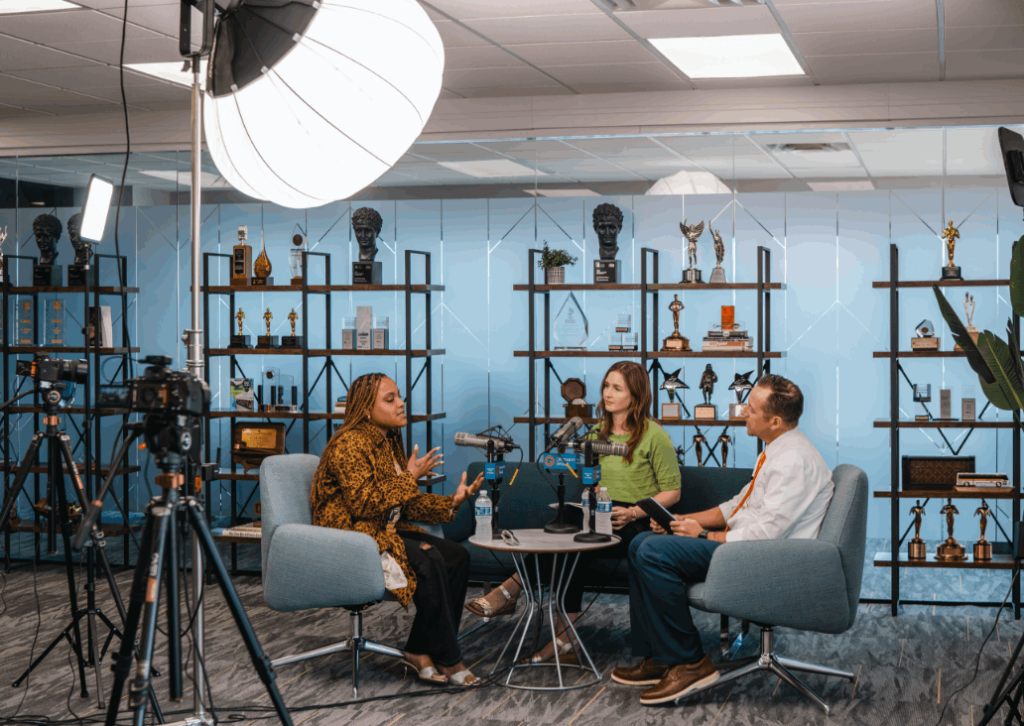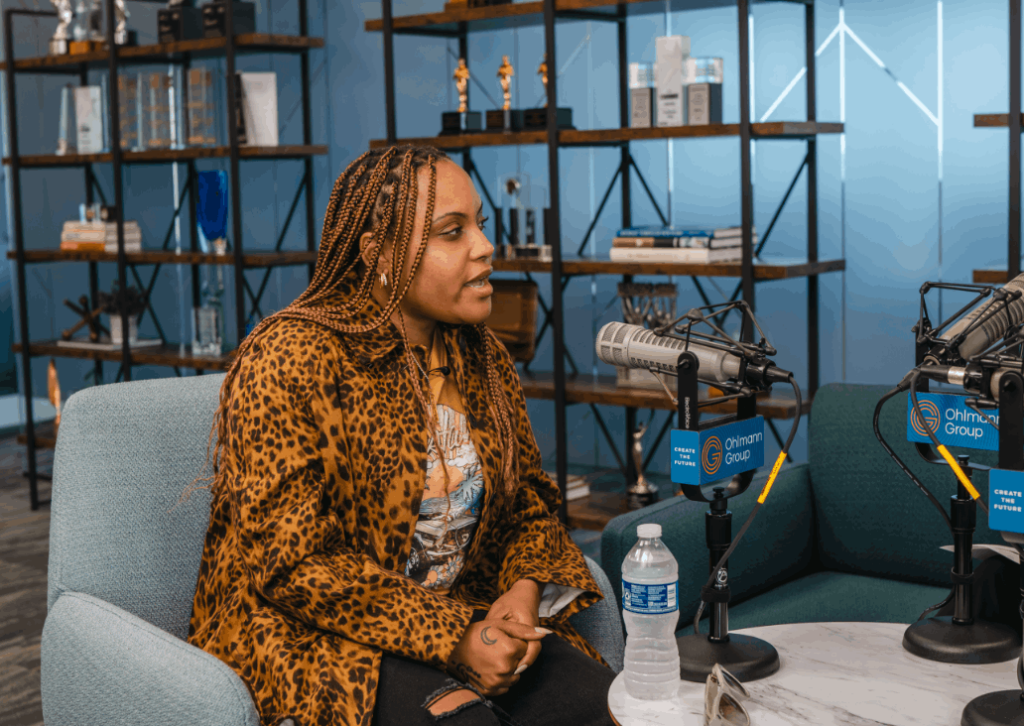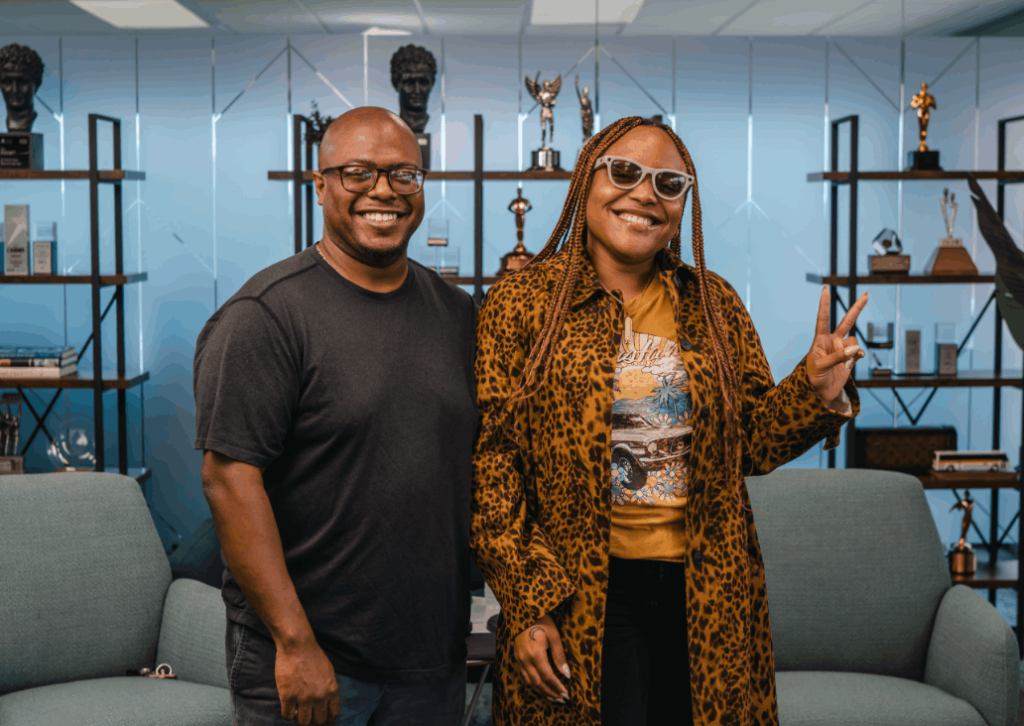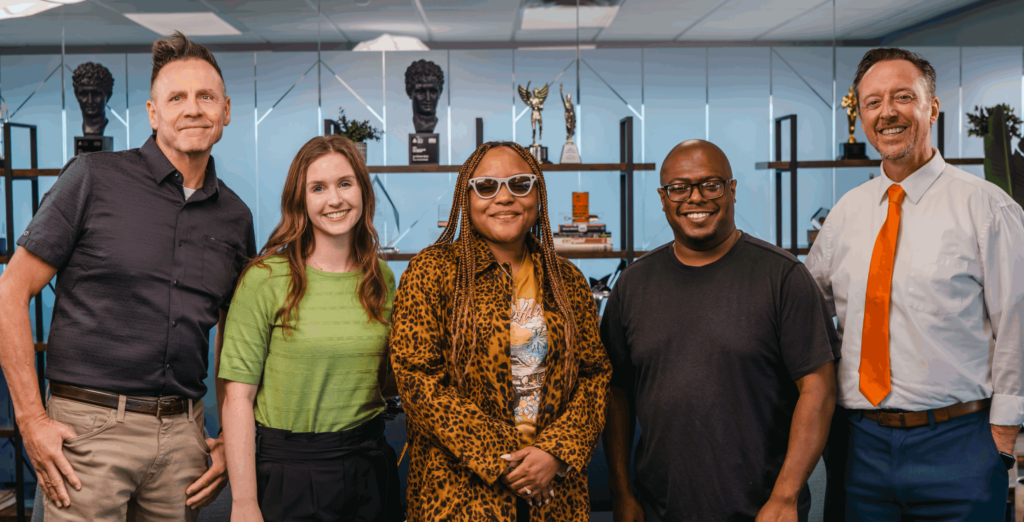As the owner and lead story coach of Lore Storytelling, Te’Jal Cartwright harnesses the transformative power of storytelling to help individuals and organizations create connections, build relationships, and foster real community collaboration in Dayton and beyond.
Visit the Lore website and follow Te’Jal on Instagram to keep up with the latest storytelling events, classes, and updates.
Listen Now!




Episode Transcript
Evelyn Ritzi: Hi everyone, and welcome to Creating the Future. I’m Evelyn Ritzi —
David Bowman: — and I’m David Bowman,
Evelyn: And today we’re joined by Te’Jal Cartwright, the owner of Lore Storytelling. Te’Jal is a story coach with a strong background in media and journalism. As the owner and lead story coach of Lore, Te’Jal is ushering in a new era combining the transformative power of storytelling and media to help organizations build relationships with team members and clients. We are super excited to have Te’Jal on the show today to share her passion for storytelling and learn about how she’s using her skills and talents to amplify and uplift Dayton. So let’s get into it.
Te’Jal Cartwright: Yay, Hi y’all, thanks for having me.
Evelyn: So we’re here today, talking all about creating the future, and we know that you are a very creative person yourself. Can you tell us a little bit about you, your background, and how creativity is part of your life?
Te’Jal: Yeah, so I was born and raised in Dayton, Ohio, a true gem. I have a son. I have a blended family, a fiancé. Creativity, I think I’m just like, really getting tapped into it. I didn’t really grow up like, you know, how some homes are, like, creativity. I think my home was more practical and, like my parents, definitely let me, like, delve into theater and things like that. But it was never like, I was true. I was truly passionate about it. But they were never like, yes, this could be a career. It was always like, you can play in these things, but like, what are you really interested in? Like, being a teacher, a doctor, a lawyer, or something. So I think it took me a long time to really get reconnected with creativity. And yeah, I think now I’m able to, I was able to tap into my creativeness through storytelling, is very simple, straightforward. I’m a very transparent person, and so I feel like storytelling is so raw and authentic because you’re literally just for me telling the truth, and the most basic way, I don’t have to make anything rhyme. I don’t have to put it on the hook. It’s literally like straightforward and fun if you know how to do it.
David: Yeah, and it’s, it’s simple, but it’s not easy, right?
Te’Jal: Yes, and I think that’s my favorite part. I know we’ll talk about this later, but when I first understood that storytelling was a thing, I was just like, how is it a business? Like, what? How is it a business – and Bridget Flaherty, who founded Lore, she showed me, like how to craft a story and like the different things you can do with it. And I think that that was like my connection to creativity.
David: Well, it’s kind of perfect set up for the next question, which brings us right up to today and to Lore. And, so tell us how, how did you get involved with Lore, and then how did you transition to become the owner now,
Te’Jal: Yeah, so I tell the story all the time, but when I had my son in 2017 the cost of childcare was way too high with me and his father just having our jobs. So I started a digital marketing business, I figured I’d take my millennial skills and social media and make a profit. There were so many people and new business owners that needed support with social media and Bridget was one of them. With Lore. She had just started this storytelling business, and a mutual friend introduced us, and she became a client. And so at first, Lore was a client, and I just used to post for them, and just like work with their social media. And then I took the class so I could market it better, and I just fell in love with it.
Evelyn: I love that story.
Te’Jal: Thanks, yeah it was so random, and I think that’s the thing. About Lore is like, I enjoy it so much. Time is just going by so fast, and I’m not even, I wasn’t even realizing the responsibilities I would take, like, just to support Bridget and Lore while she was running the company, and the next thing I know, I’m like, coaching classes myself and a story coach, and now the owner. So it’s just crazy how when you love something so much, you just put so much into it effortlessly.
Evelyn: And I love the idea of storytelling. And as marketers, storytelling is a huge part of what we do. It’s how humans connect to each other. We’re literally wired for it. As a story coach and someone that works with individuals who are maybe just want to tell their personal story, or tell the story of their business or their brand. How are you working with them as a coach and helping maybe people who are like, apprehensive or nervous to do that kind of public speaking and sharing, and how does that relate to businesses and brands?
Te’Jal: Yeah, those are actually becoming like some of my favorite people to work with, just to, like, watch the transformation from, like, we do workshops and classes, but from the first moment you meet someone, and they’re like, I don’t have a story. And it’s like, well, you’re breathing. You have a story. Let’s find it. Because everybody has a story. You probably just don’t think of the smaller details, or you probably just don’t think it’s important, but it really is. Or you’re, most of the time, I feel like people are just scared because they want to tell a story, but they’re nervous to tell that story, so they skip over that one and are like, trying to find this mushy, gushy story when maybe they want to tell, like, a really sad story or, or one that just made them feel uncomfortable. So that’s fun. What was your question?
Evelyn: How are you as a coach—like talk about the classes, and how you’re helping people overcome those fears, one on one? Yeah,
Te’Jal: Yeah, it’s just really talking people through it, letting them know I still get nervous too. Sorry about that slap. I still get nervous too. It’s literally just redirecting that energy so it’s like you feel nervous, okay? That’s also in connection with excitement, so you can take that nervousness and help it propel you. And I mean, you still are nervous, but then after everybody shares their story, they’re like, on this high and just super happy and super proud of themselves, because it really takes a lot for a lot of people to sign up or put themselves in that space.
David: Yeah, and I mean, I’ve seen it firsthand at some of the storytelling events, where people will stand up and tell that story in front of an audience, and it’s just spectacular to see people get up there and a, not just to tell the story, but to do it with confidence and to move people to tears, and people who aren’t trained public speakers, who don’t do that for a living, to just get up there and be real, right? And to put it out there like it is such a moving experience, and that I assume that is just like endlessly rewarding for you to see.
Te’Jal: Yes, I feel so fulfilled. It is. I’m a forced entrepreneur. I’m an entrepreneur by force. I think that this is really the only opportunity I have to put motherhood first. Motherhood is very important to me, and so Lore gives me the flexibility to volunteer in Luke’s — my son’s name is Luke — and his classroom, or to show up for him. And so Lore is worth it, and it is something that I will fight for, and, you know, advocate for, especially authenticity, because, like, we’re in some crazy times, and I’m a huge believer in collaboration and community, and the only way that we can like have a strong foundation is through communication and storytelling, I believe.
David: You mentioned collaboration, right, that’s a huge aspect of your work, your leader, you’re a story coach, so talk about how you’ve collaborated with businesses, specifically Black-owned businesses here in the community, and what that experience is like.
Te’Jal: Yeah, so I think that I really am just now understanding what collaboration is. I would say I’ve worked with Black businesses in the past to, like, help share their story in a way that was most authentic to me and to them. I felt like I would watch the news sometimes, and I love the news shout-out, but like there was only so far the story could go in such a time frame, and it was maybe the same stories, like a triumphant story or, you know, and I wanted to dive deeper into the stories of Black business owners to build community and share maybe why a product will be late, or why it was more expensive, or how much time and energy and money went into, how, having a space downtown. And so I think I’ve collaborated with Black businesses in the past just to get their stories out, and just to build the Black economy, just so that we can make decisions and provide a higher quality of life for our people.
David: I think what’s, what’s really cool to me about that too, is like the news often is negative stories, right? Because those are impactful, they generate ratings, et cetera, for a variety of reasons. But there are stories of hope and optimism and success that, without the work of people like you, those are stories that remain untold, stories that people don’t hear—and we find ourselves in the stories of others, right? Like, so to me, I see the work that you do as not just helping people tell their story, but then helping others to connect to that story and find their own story, right? Like, to me, that just so moving.
Te’Jal: Yeah, it’s like, if you tell your story, you’re bound to be able to connect with one person, because you’re not the only person, even though there are a lot of experiences that make us feel isolated, or like we’re the only one going through it or but storytelling helps us unveil that, and like, say that’s not true. Somebody else is experiencing, and this is how we can connect around it. I think my favorite thing is seeing like this last season of What’s the Biz that we produced last year with Launch Dayton, I did more of a focus group, group conversation, discussion panel experience, and it was cool to see, like, how we all collaborated together to share the message of the season, but then also how those people connected outside of what’s the biz because of our conversation. So, I mean, it’s just always, it never gets old to see that stuff happen. I’m always surprised. I’m always like, wow, I didn’t expect that or what that happened. It’s just crazy.
Evelyn: It’s building a community. And even with Lore, I know recently you had like, alumni get together and reconnect. It’s the people you go through that experience with, whether they’re listening to the story or attending a class together and creating, crafting their stories to share with the public. I think that’s just huge. And in a town like Dayton, like that, community, it becomes really tight-knit.
Te’Jal: Yes, I’m so excited. And we definitely did just have a reunion yesterday at Joui Wine. It was, it was really magical. This week has been actually really hard for me, and I didn’t know if I was going to be mentally there yesterday, but then I got there and saw all the people who’ve taken a Lore class, and it was like medicine and just talking about our stories, and I was sharing that I want to start a podcast for Lore, like after the after people tell their stories. And everyone was excited. And there was one story in particular, who when he told his story, I had so many questions for him, like, after he told it, I don’t know if it’s okay. I’m sure it’s okay, but his story is deep. It’s about a man and his experience with bipolar disorder. And when he told his story, I had so many questions. But anyways, yesterday I asked him if I could ask him all my questions, and he was excited. So, um, just this new branch of digging deeper is like just a passion of mine.
Evelyn: It feels like it’s a supportive community. I know, whether attending a Lore event or I’ve gone to, like story slams and things like that before, it seems like Dayton, specifically, is really supportive of it, and people are willing to come and listen with open minds. Do you think that’s unique to Dayton as someone that grew up here? Does that play into why you like it here, why you’ve stayed here for so long?
Te’Jal: Oh, that’s a great question. So when I graduated from college, I would travel the U.S. a lot. I was a traveling fundraising manager. So I would go to different universities and the Minnesota Orchestra, and, like, run a fundraising office. And when I was traveling, I would go to all these places, and I would think about Dayton, and just like how Dayton was just that spectacular, and how when I moved, I wanted to get away from home, because I just, I just couldn’t see what was here for me, other than my dad and traveling, I kind of found Dayton and all those places. And so I would say, is the storytelling climate culture specific to Dayton? I don’t think so. I think that this community is created in a lot of places, but I think that Dayton has its own, like, you know, just culture that makes it. Different, just like Louisville has their own storytelling culture. Detroit all these different places. So I think Dayton and the recipe that we have makes our story culture different, but I think it can be found anywhere, just like to the taste of the city.
Evelyn: And I know you’ve traveled a bit to tell stories, I think that’s really cool. And yes, representing Dayton in different cities.
Te’Jal: Yeah, I’m always proud to represent Dayton. It’s been that was like a challenge to myself, because I really don’t like telling stories, like, in front of people, I get very nervous, and it’s like, I put a lot of my energy into story coaching. So to me, in my mind, at the when I became a story coach, it was like one or the other, but going to the different cities was a challenge to myself, to put myself out there. And if I’m coaching people to be coached, instead of like being coming from this, you know, I’m coaching you how to craft a compelling narrative. It’s like now people can see me in my vulnerable state. I recently told a story about being a klepto as a child. Yeah, that was my first time saying it out loud, like I knew I had went through that, but I didn’t really understand how deep it was until I went back to revisit that time in my life. But that’s a vulnerable story, and after I got off stage, people are making jokes like, Oh, I hope you didn’t steal anything. So it’s like, it’s like, that’s funny and it’s cool, it’s still embarrassing. And so being able to tell an embarrassing story like that is just my goal in life.
Evelyn: Well, it’s memorable too. Like, if somebody can relate to that, or think it’s funny, or in some way connect with that. They remember you, and they want to further that relationship. And that’s huge. Whether you’re an individual or you’re representing your company or your brand. That’s huge.
Te’Jal: Yeah, yeah, they’ll remember me as the little girl who was stealing stuff, stealing Pokemon cards. Pokemon cards. Yes, it was Pokemon cards. I
Evelyn: [laughs]I mean, those are meant to be traded. I mean, you know, the person agrees to the trade or not…
Te’Jal: That is true [laughs].
David: So you’re someone who is just so inspiring. But I’m curious, where do you find inspiration? Authors, videos, podcasts, are, where do you turn to to find things that inspire you and move you?
Te’Jal: That’s a great question. Um, I would say I’m inspired by self-help books. Like, yeah, I was telling my friend I want to, like, open up my reading, all of my books are like, do better. And this is how I’m inspired by books. I’m inspired by my friends, Bridget. Bridget has truly inspired me. Oh my gosh. She’s just inspired me to believe in myself and to take myself to that next level at all times and to really not like, there’s never an excuse with Bridget like, if there’s something that she wants to do, she sees it, she doesn’t see the excuses. And if she does, she pretends they don’t exist. And that has like, having that mentality and learning from her in that way has taken me so far. And like all aspects of my life, I feel like God inspires me through, like, many different people and things and shows I really love, like Atlanta, like highly creative people. The show Atlanta, the show highly creative people inspire me to, like, break outside the mold and do something that comes to my brain, even if it doesn’t make sense to anyone else. So I would say those things. And my son, I was telling him the other day, because he was trying to tell me he couldn’t do something. And I was like, Luke, like when you were little and learning how to walk, every time you fail, I would think like, Oh man, this is it. Like he’s not gonna wanna walk anymore, like he just keeps falling. But you kept going, and you kept going, and you didn’t really have the concept of not getting something. You just knew you wanted to walk with me and your cousins and your dad and stuff. And so I think my son inspires me through his like, learning and him just growing and just really not understanding the concept of failure completely just yet.
David: And that’s a really great example, because, like, as little kids like that, like learning to walk, there’s no fear of that, right? It’s just like I fell down. I want to get up. How do I do this? Right? I’m gonna try this or try that, and it’s literally just trial and error with zero shame or embarrassment, right? Like they literally fall on their face and think nothing of it. Occasionally they get a bump or scratch and cry a little bit, but then soon as they’re done, they’re back at it, right? And it’s like, how do we keep that spirit right, where it just because we fall down isn’t a shame in that you tried right? And just keep going.
Te’Jal: It’s so hard. And. The word that comes to mind where you were saying that is patience. Like just having patience. My fiancé, he’s very patient with himself and his growth, and just watching him, and his even his workout journey. He likes to run, and now he runs so many miles, I don’t know how many, like 9,10, and he wants to grow and grow, and it’s been years in the making. So patience comes to mind when it comes to, like, goals or anything like that, just having patience.
David: Yeah, I think too, there’s like a piece of that. It’s coming back to, like, storytelling, right? It’s if you’re a toddler, well, you don’t tell yourself a story about failing to walk. You just try to walk, right? But we tell ourselves these stories, these failure stories, of like, well, I’m never gonna figure this out. Or I’m like, all these baggage or, like, well, I couldn’t figure that out. And I’m this type of person, like, like, story, to me, is so fascinating because it permeates our lives in so many ways, right?
Te’Jal: Yeah, did you guys see Inside Out 2?
David: I haven’t seen it yet.
Te’Jal: Oh my god, I want you so, oh, my god.
David: Always like, my allergies.
Te’Jal: Yes, I definitely cried on this one. And I like, I like, don’t cry that much. And so, like, um, but yes, stories you see, did you say you saw?
Evelyn: No —
Te’Jal: Oh, okay, okay, I definitely have a seven-year-old, though, so I’m
Evelyn: I’m like, scared to be that adult in the movie theater.
Te’Jal: I understand, maybe when it
Evelyn: comes on streaming, yeah,
Te’Jal: But yeah, the stories we tell ourselves are so important, and I think that was a good reminder for me too.
Evelyn: Yeah. And I would love to know, having not taken a Lore class, what kind of is that process like for someone that’s ready to tell their story or thinking about it? What, how do you go about that? And what is like? What does that culminate in, as far as like, telling your story?
Te’Jal: So we actually, we used to like wait to post the classes until like, the month before, but now we have a schedule, which is the first time Lore has ever done that we have multiple classes up on the site. So one would just go to our site and sign up for a class. It’s a four-week class once a week, every Monday, and it’s very repetitive. You kind of share your story. You build a community with four other people who are like, either nervous, excited, or just ready. You have a slew of different emotions. And I basically just work with you in a group and one-on-one to help you craft this story, and then you share it in the Lore community. So we like to partner with local businesses, and we’re grateful for their partnership too. Like a good space is always the best. And basically at that space, there’s about 30 to 40 people there each time, from the Lore community, from the storytellers, community that are there to receive your story, like to clap it up, to cry with you, laugh with you. And I think that that is like something that is unique. Lore just has this, this essence, this um, dependable community that is, like, just loving, but, yeah, I would say I think people just really have to just pull the trigger. I hear a lot of like, Oh, I’m gonna take it. I’m gonna take it one day. And I’m so excited when I see people my one-dayers who like, pull the trigger. When I see their name pop up on my email like this purchase, this order is a purchase by it’s just fun to see people like dive into their feed, right?
Evelyn: And you don’t have to come into it knowing what your story will be like. Part of the coaching is that you’re helping craft that and figure out what’s the best story that the person has to tell.
Te’Jal: Yes, in the first class, we kind of go through themes and things like that. So before we go through them, I’m like, does anybody know what story they want to tell? And maybe, like, 90% of the class doesn’t. I’m like, okay, I’m telling you. Every time we go through this first part, you find your story. And so then at the end of the first class, I’m like, did you find your story? Everybody did. Everybody did. It always happens. I’ve never had a person that was like, No, I didn’t. And I think that’s the coolest part too. Now people might change their story, like the next week, and come back with a new story, but no one ever walks away without having that story.
Evelyn: That’s got to feel really empowering, and it is an expression of creativity too, I think for on your end, but also for those receiving — I think so wonderful. So, we always close out by asking our guests one last question, and that’s, what’s the future that you want to create in Dayton?
Te’Jal: Like just with Lore in general?
Evelyn: I think for you personally, as someone that’s grown up in Dayton, what? What’s the future that you — the impact that you want to make?
Te’Jal: That’s a great question. Um, the impact that I want to make. I just want to continue to build the muscle of authenticity and transparency in community. I’m very into, like, communities, cooperatives, collaboration, and I just want to be a legend, or looked at as someone who made people feel safe enough to communicate and have better relationships, for like, the sake of our future, I’m just like, I don’t have any superpowers. I can’t close the ozone, you know, hole, or, like, the but I can definitely talk to people and be my authentic self and hopefully inspire others to do the same.
David: I’d say, that’s your superpower.
Te’Jal: What’s your superpower? I know we’re closing out, but what would you guys say your superpower is?
David: Probably drawing on post-it notes or a whiteboard or something silly.
Evelyn: And I’m a listener. I listen to that.
David: Her superpower is patience.
Te’Jal: That’s real. I’m all out of it. Y’all this dog has got me at my end [laughs].
David: Well, thank you so much for joining us today.
Te’Jal: Yes, thanks for having me. This was great.
